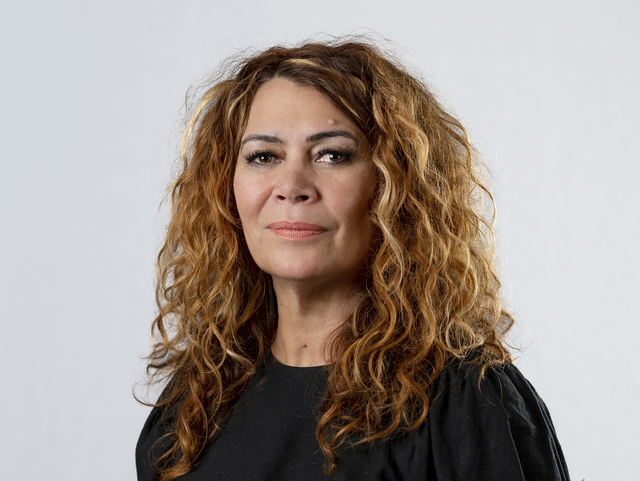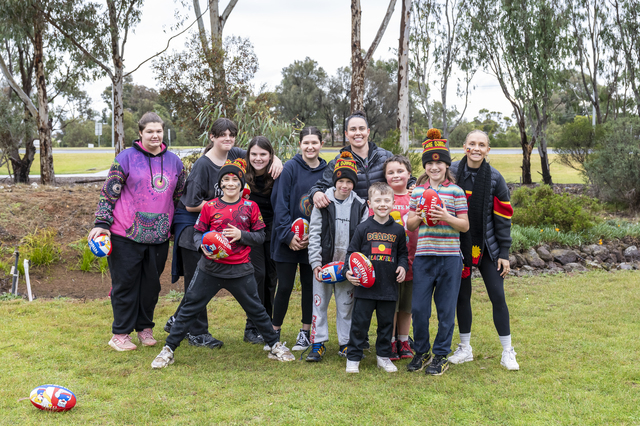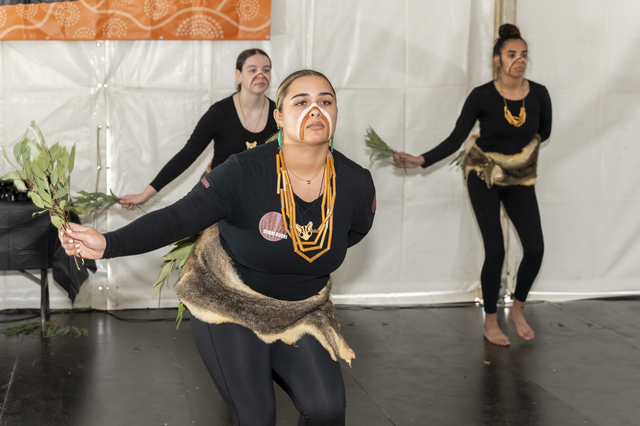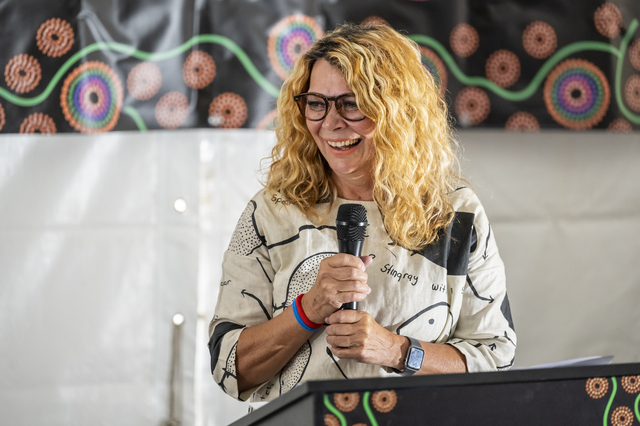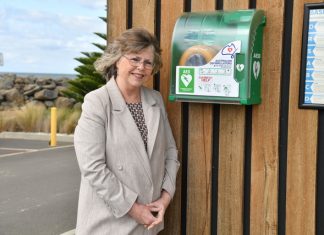For more than 20 years, Indigenous organisation Djirra has been committed to a future without family violence. One year since setting up in Melton, the goal remains the same, Eddie Russell reports.
Meteorologists would tell you that July 9, 2024, was a terrible day, with icy cold winds sweeping the landscape and dark clouds releasing an incessant drizzle of rain from the skies above.
However, bad weather could not dampen the mood of the 400 people who turned up to celebrate NAIDOC Week at Djirra in the West.
Among the crowd of women, children, staff, local businesses, and community figures was then Indigenous Australians Minister Linda Burney.
She said the impact of Djirra was not limited by geography and its ability to empower, inspire, and strengthen First Nations people was remarkable.
“I want to acknowledge the important contribution that Djirra makes, not just in this part of the world but right across Victoria,” she said.
“You power our communities for our communities through self determination.”
Ms Burney said in her eyes, NAIDOC Week is “about the future” and that Djirra’s engagement with youth year-round was critical.
“In recent years, we’ve seen a generation of young Indigenous people putting up their hands and I know that you foster that here.”
The occasion coincided with the one year anniversary of the establishment of Djirra in the West, which allows the organisation to expand its reach and network of services to the western suburbs and beyond.
The homecoming has proven significant for chief executive Antoinette Braybrook.
Ms Braybrook, who is also co-chair of national Indigenous justice coalition Change The Record, said “the west is in my blood.“
“I grew up in Melton with my family… so I’m especially proud that Djirra is now such an established part of this community,” she said.
“Djirra in the West is an extraordinary place with a very special energy, and that energy comes from Aboriginal women.”
Djirra provides legal services, runs workshops, and advocates to government for Indigenous women who face family violence – which, unfortunately, is an all too common reality.
“If you are an Aboriginal woman in Victoria, you are 45 times more likely to experience family violence – perpetrated by men from all backgrounds – than other women,” Ms Braybrook said.
To address this dramatic overrepresentation, Djirra places an emphasis on getting to the root of the issue to stop it before it happens or in its early stages.
Ms Braybrook said a variety of assistance was on offer to improve the livelihood and wellbeing of First Nations women.
“Our early intervention and prevention programs provide yet another access point for Aboriginal women and girls to obtain advice from our specialist, legal, and non-legal support teams for their safety,” she said.
“They are essential to ending violence and it is critical that women have access to these programs.”
Being an Aboriginal Community Controlled Organisation means Djirra is in a stronger position to contact, communicate, and connect with its audience, Ms Braybrook said.
“Djirra’s signature programs are designed by and for Aboriginal women. They are about keeping our women connected and safe, not isolated.
“The programs take Djirra into our communities and to our women so they don’t have to come to us directly.”
The Victorian Royal Commission into Family Violence has recognised Djirra’s programs as best-practice, particularly its wrap-around approach to the issue.
A wrap-around approach is a common philosophy of care used by organisations that encompasses a defined planning process and builds constructive support networks.
Djirra has four main early intervention and prevention programs: Young Luv, Sisters Day Out, Dilly Bag, and Koori Women’s Place.
They provide a safe ways for women to learn about family violence and legal support available to them as well as how to access it.
Sisters Day Out is a one-day wellbeing workshop where Aboriginal women can get information about legal rights and engage with both mainstream and Aboriginal support services.
The sense of community and support present during the program encourages attendees to share their experiences and, in turn, seek help, Ms Braybrook said.
“Sisters Day out builds trust and breaks down barriers to accessing safety and support. Djirra’s lawyers, counsellors and case managers are available on the day if a woman chooses to access them confidentially.”
YoungLuv equips Aboriginal teenagers aged from 13 to 18 with the information they need to challenge unhealthy relationships and practise safe behaviours at a formative stage of their lives.
Ms Braybrook said having a communal space to reflect in allows participants to better understand the important issues affecting them.
“The success of Young Luv highlights the extent to which girls value the opportunity to come together in a culturally safe environment to discuss important issues for them with Aboriginal facilitators who understand and share their culture and community.”
The Dilly Bag program is a three-day retreat held on country that draws on cultural principles and heritage.
“This promotes healing and informs Aboriginal women … on how to live culturally safe and meaningful lives,” Ms Braybrook said.
These workshops not only promote and raise awareness of healthy relationships, reducing vulnerability to family violence, but also minimise social isolation as well.
The lack of judgement at Koori’s Women’s Place is “so crucial“ to healing, Ms Braybrook said.
“It provides Aboriginal women and children with a range of support, including free workshops and social activities, connection to one of our legal or non-legal services, or practical support like a warm winter coat and essential groceries.”
Prevention of Family Violence Minister Vicki Ward said the state government would continue to invest in Djirra in the West so it could keep delivering crucial services and championing Aboriginal women.
“It is important to me that we continue to support their work which builds confidence and connection to culture for so many women and girls,” she said.
“I look forward to continuing to work with Djirra as they offer emotional, cultural, and practical support to Aboriginal victim-survivors of family violence.”
Djirra in the West’s next event will be a wood burning art and crafts circle from 11am – 1pm on Thursday, August 29.
Details: djirra.org.au/


